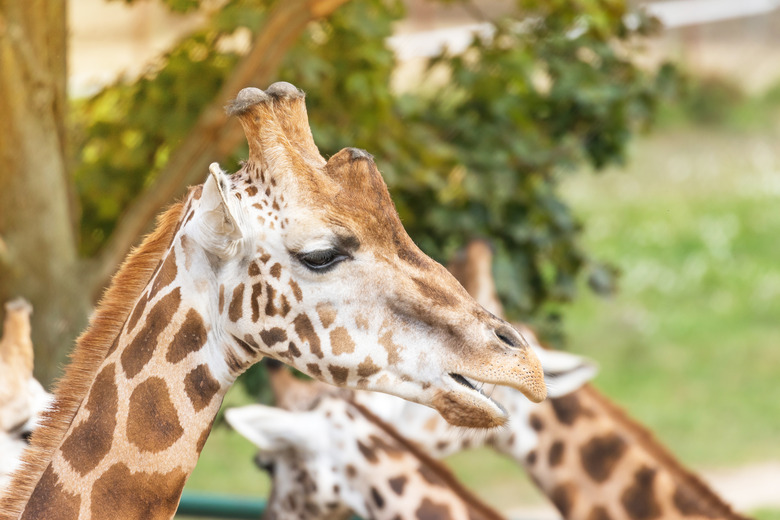The Characteristics Of A Giraffe & How It Helps It Survive
Giraffes, the tallest land animals on Earth, are found in Africa in dry zones south of the Sahara Desert. Trees must be present in these areas, since giraffes typically graze on tree foliage. Giraffes are social animals and will form small, unorganized groups without a leadership structure. They have an average life span in the wild of 25 years.
Physical Characteristics
Physical Characteristics
Adult giraffes range from 14 to 19 feet tall. They weigh between 1,750 and 2,800 lbs. Typically, females are lighter than males and about 2 feet shorter. The long neck has only seven vertebrae, but each is greatly elongated. A giraffe's front legs are slightly longer than the rear legs. The skin patterns may help camouflage them from predators. Some subspecies have patterns that are shaped like oak leaves. Others have square-shaped patterns. Giraffes also have up the three horn-like knobs covered with skin and hair on their heads. The knobs, ossicones, are formed from calcium deposits according to the San Diego Zoo.
Diet
Diet
A giraffe's principle food source is the acacia tree, which is known for its nasty thorns. Giraffes use long tongues of about 18 inches to reach around the thorns. Thick saliva protects a giraffe's digestive system in case of a thorn is accidentally swallowed. Occasionally they will also eat shrubs, fruits and grass. A mature giraffe can consume up to 75 lbs of food per day.
Behavior and Reproduction
Behavior and Reproduction
Male giraffes have been known to fight for dominance in regard to females by butting their necks or heads together. Most of these fights don't result in serious injury. Female giraffes are sexually mature in their fifth year, and pregnant females have a gestation period of 15 months. A newborn calf is about 6 feet tall with a weight of approximately 150 lbs.
Survival Traits
Survival Traits
The best protection a giraffe has versus predators is its size, but giraffes are also surprisingly fast with speeds of up to 35 mph. They have a powerful kick that can kill carnivores such as lions and crocodiles. Giraffes are most vulnerable at watering holes because they have to bend their necks a long way. Giraffes often gather in groups at watering holes and take turns watching for predators. Since acacia leaves contain abundant water, giraffes can survive a long time without drinking at watering holes. The giraffe's ability to digest rough plant food such as leaves is another survival trait. The animal has a stomach containing four compartments. Giraffes partially digest rough plant material, then regurgitate it back into the mouth to chew like cud.
Cite This Article
MLA
Fielder, Dan. "The Characteristics Of A Giraffe & How It Helps It Survive" sciencing.com, https://www.sciencing.com/characteristics-giraffe-helps-survive-8248661/. 22 November 2019.
APA
Fielder, Dan. (2019, November 22). The Characteristics Of A Giraffe & How It Helps It Survive. sciencing.com. Retrieved from https://www.sciencing.com/characteristics-giraffe-helps-survive-8248661/
Chicago
Fielder, Dan. The Characteristics Of A Giraffe & How It Helps It Survive last modified March 24, 2022. https://www.sciencing.com/characteristics-giraffe-helps-survive-8248661/
